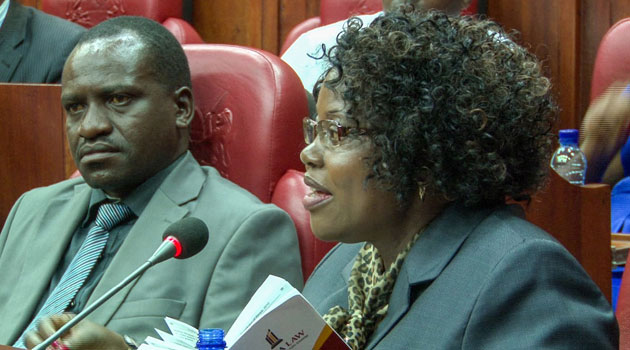 For every Sh10 of the Sh540 billion spent in the first three months of this financial year, only a shilling went to development.
For every Sh10 of the Sh540 billion spent in the first three months of this financial year, only a shilling went to development.
The revelations in Controller of Budget’s (COB) report tells the story of the country’s warped wealth creation formula as it pours its fortunes on recurrent spending.
Disbursements to various departments and counties were painfully slow to the point of disrupting plans and projects.
Controller of Budget Agnes Odhiambo says in her quarterly implementation report for the period between July and September 2018, actual receipts into the exchequer account amounted to Sh540billion, representing 20.5 per cent of the annual target (Sh2.6 trillion).

This represents a 32.3 per cent increase (Sh131.9 billion), over a similar period last year, the report says in part.
In a similar period last year, the government collected Sh408.1 billion. In the first quarter of this year, the national government’s expenditure was Sh429.3 billion.
From this amount, Sh217 billion was gobbled up by recurrent expenditure in ministries, departments and agencies.
Appetite for borrowing Debt repayments for the first three months doubled from Sh75.3 billion to Sh153.6 billion. The Jubilee government has had a huge appetite for borrowing to finance its development blue print.
But the poor development expenditure betrays this dream in what has left loans to fund the biggest share of the projects.
In the current financial year, the government plans to spend a staggering Sh870.6 billion to pay debts. Out of this, Sh400 billion will go towards interest payments and the remaining Sh470 billion will go towards debt redemption.
Poor or slow returns from the projects mean that the government has to turn to taxpayers to pay the debts, leaving it more financially strained.
The consolidated fund services consumed Sh160 billion leaving the national government with a paltry Sh51 billion for development expenditure across all government departments, ministries and agencies.
This means that just one out of every ten shillings went towards development expenditure.
Counties received Sh23.5 billion as sharable revenue in the period, giving them just enough to survive.
Breaking the development expenditure at the national government alone paints a more disturbing picture.
The CoB notes that in the current financial year, the approved development budget is Sh676.6 billion.
But in the first three months of the year, only Sh23.4 billion had been spent from the exchequer issues, a huge drop from the previous year.
“Recurrent expenditure received the highest proportion of exchequer issues as a proportion of net estimates at 20.1 per cent while the development expenditure received the lowest at 5.4 per cent,” the report adds.
Development expenditure is important because it is the money that actually goes into projects and new initiatives to make lives of Kenyans better.
But if the government only pays salaries and keeps its staff happy, they may never have the necessary infrastructure to do their work.
Analysis of the recurrent expenditure shows that personnel emoluments continued to take up the lion’s share of the expenditure.
Government employees took home Sh88.6 billion, which is 40 per cent of the total recurrent expenditure. This amount excludes the salaries for national intelligence service staff and partially the Ministry of Defence, which the CoB never reports on.
It means that if these two were included, salaries would cross the Sh100 billion mark by the third month of the year.
Paying teachers alone took Sh58.1 billion, making the Teachers Service Commission, the agency that received the biggest amounts.
Domestic travel was the third highest economic item at Sh1.7 billion, followed by rentals and rates on non-residential buildings at Sh1.1 billion.